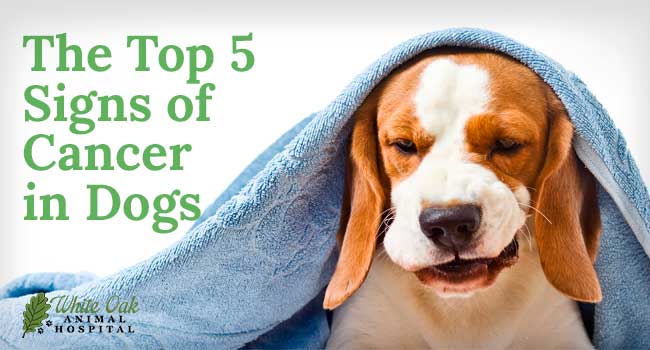
Understanding the signs of cancer in dogs is crucial for pet owners. Early recognition of these signs can profoundly influence the success of treatment and contribute to the overall health and happiness of the pet. Regrettably, cancer is a prevalent concern among dogs, with specific breeds exhibiting higher susceptibility than others. Therefore, equipping oneself with knowledge about these common signs becomes imperative for every pet owner. By staying vigilant and familiarizing themselves with the telltale indicators of cancer, pet owners can take proactive measures to seek veterinary assistance promptly. This proactive approach not only facilitates timely diagnosis and treatment but also holds the potential to enhance the prognosis for their beloved canine companions.
Understanding Canine Cancer
The Top 5 Signs of Cancer in Dogs
Unexplained Weight Loss
Sudden weight loss in dogs can be a crucial indicator of potential cancerous conditions. While weight loss can sometimes be attributed to other health issues, such as dental problems or infections, seeking professional veterinary advice is essential if your dog experiences unexplained weight reduction. Consulting a veterinarian promptly when you notice such weight loss ensures that any underlying health concerns, including the possibility of cancer, can be accurately diagnosed and addressed appropriately. Therefore, staying vigilant about your dog’s weight and taking prompt action in response to any unexplained changes are vital aspects of responsible pet ownership, ultimately contributing to your beloved canine companion’s overall health and well-being.
Changes in Bathroom Habits
Pet owners should closely monitor changes in their dog’s bathroom habits. Whether your dog experiences difficulty urinating or
Lumps and Bumps Underneath the Skin
Regularly inspecting your dog’s skin for unusual lumps or bumps is essential for pet owners, especially considering the potential significance of detecting signs of cancer in dogs. These abnormalities might signal the onset of tumors, with the possibility of some being cancerous. However, it’s crucial to recognize that not all lumps indicate cancer; they could also be benign growths or other non-cancerous issues. Nonetheless, it’s prudent to seek a professional assessment from a veterinarian to ascertain the nature of these lumps and exclude the likelihood of cancer. This proactive approach enables early identification and intervention if cancerous growths are present, potentially improving outcomes for your furry companion.
Persistent Coughing or Difficulty Breathing
Persistent coughing or difficulty breathing in dogs should never be overlooked, as they may indicate more than a passing ailment. While it’s common for humans to experience coughs and colds, dogs don’t typically exhibit these symptoms without a reason. Therefore, when a dog displays persistent coughing or difficulty breathing, it’s essential to consider potential underlying health issues, with signs of cancer in dogs being one of them.
Non-healing Wounds or Sores
Vigilance for signs of cancer in dogs is crucial for owners. These signs of cancer in dogs should prompt immediate veterinary care. Early detection enhances treatment success and improves prognosis—regular check-ups aid in catching cancer early. Pet owners can ensure the best outcomes for their beloved companions by staying alert and seeking prompt medical attention when necessary. Don’t ignore potential signs of cancer in dogs; early intervention is critical to their health and well-being.
Taking Action: What to Do if You Notice These Signs
If you notice signs of cancer in your dog, immediate action is crucial. Consult a veterinarian promptly to assess the situation thoroughly. Provide detailed information about the observed signs and follow through with any recommended diagnostic tests. Discuss treatment options tailored to your dog’s condition, including surgery, chemotherapy, or radiation therapy.
Offer your dog unwavering support and care throughout the treatment process, ensuring they receive medications as prescribed and maintaining regular communication with the veterinarian. Monitor your dog closely for any changes in symptoms and attend follow-up appointments as scheduled. Your proactive approach to addressing signs of cancer in dogs can significantly impact their health and well-being. Remember, early detection and intervention are paramount for improving treatment outcomes and ensuring your beloved canine companion’s best possible quality of life.
Frequently Asked Questions
What should I do if I suspect my dog may have cancer?
If you suspect your dog may have cancer, it’s essential to consult a veterinarian promptly for a thorough evaluation. Your veterinarian can perform diagnostic tests to determine if cancer is present and recommend appropriate treatment options.
Are there any signs of cancer in dogs that I might overlook?
While some signs of cancer in dogs such as lumps or weight loss may be more noticeable, other symptoms, like changes in behavior or appetite, could be subtle and easily overlooked. Pay attention to changes in your dog’s health and behavior, and consult a veterinarian if you have any concerns.
How can I best support my dog if they are diagnosed with cancer?
Supporting a dog diagnosed with cancer involves providing them with comfort, care, and any necessary medical treatment. Work closely with your veterinarian to develop a treatment plan tailored to your dog’s needs and follow their recommendations for medications, dietary adjustments, and monitoring. Additionally, offering your dog love and attention can help them cope with the challenges of cancer treatment.